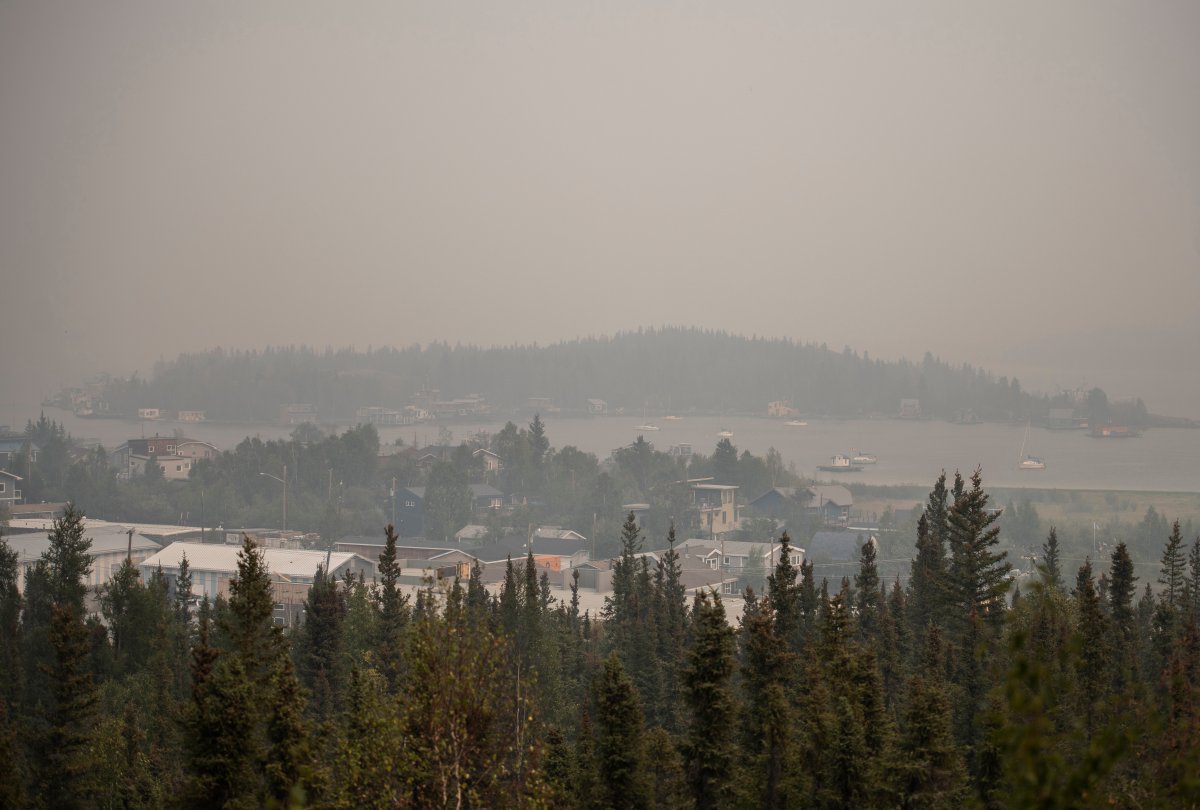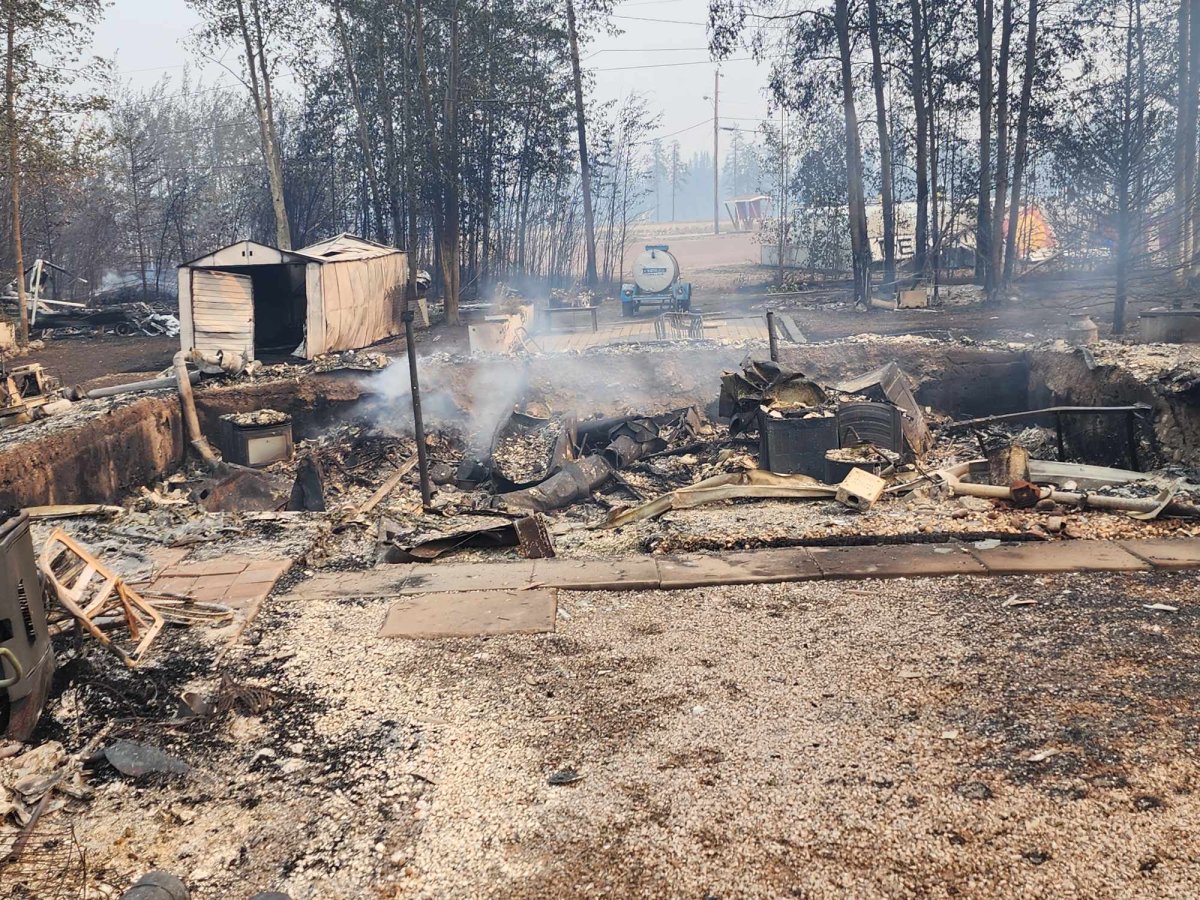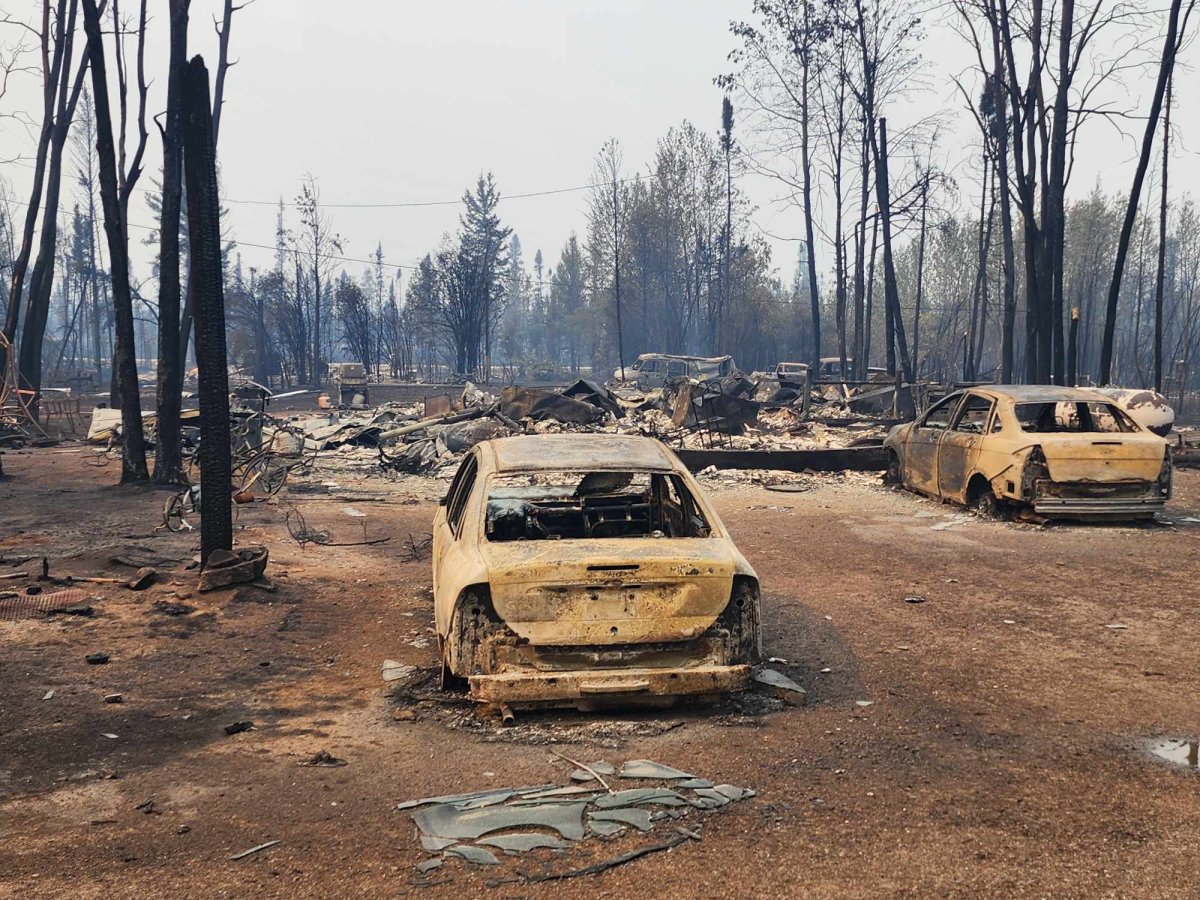Debilitating smoke has been hanging over the heads of many in Yellowknife for days and a wildfire on the outskirts of the northern city is growing steadily.

“It’s a little unnerving,” said Wayne Langenhan, one of many residents scrambling to sort out an evacuation plan.
There was some blue sky Wednesday but that isn’t diminishing the anxiety and stress many in the northern city are experiencing.
“I think it’d be better if I had a few beers,” Langenhan said — perhaps only half joking.
There’s been more than 200 wildfires this season across the Northwest Territories that have already burned an area four times the size of Prince Edward Island.
“The Northwest Territories has never faced a situation like this in terms of wildfire,” wildfire information officer Mike Westwick said Wednesday.
“The thing that is making this year much different is the scale — the human toll of what’s being faced.”
Westwick said normally, most of the wildfires are in remote areas.
“We have a lot of open spaces here. This year, the fires are happening close to communities, and that’s causing major, major stress for people,” Westwick said.
Westwick said eight communities have evacuated, representing 15 per cent — or nearly 6,800 people — of the territory’s population.
“It’s unimaginable, what people are going through up here.”
One of those fires all but wiped the small community of Enterprise, some 80 kilometres north of the Alberta border on the Mackenzie Highway, off the map.
“I lost quite a bit,” said Paul Flamand, a father-of-three from Enterprise who fled north to the community of Wrigley.
Flamand runs a plumbing business in the community of 100 people where nearly every building was consumed by flames earlier this week.
“I lost my house, a couple of shops. Everything I’ve worked for and worked on, all my projects.
“Everything I loved in life is gone.”

People from the hamlet fled their homes on Sunday, going north and south.
There was no cell or internet service because the wildfire near Enterprise destroyed a telecommunications fibre optic line in the area, however Flamand had a Starlink satellite internet dish and used that to find out what had happened back home.
“We were able to get ahold of family members and community members and find out the worst,” he said.
“The pictures say it all — there’s not much left.”
In St. Albert, on Edmonton’s outskirts, Tanisha Edison arrived at a fire evacuation centre after a 19-hour drive from her home in Hay River.

Get breaking National news
Edison, who is days away from giving birth, said the trek took her through Enterprise.
“The town was gone pretty much,” Edison said. “No buildings left. It was just metal frames melting.
“You couldn’t even read the signs because when the fire blew through there, they were all melted.
“Trees were like ashes. Everything was like ashes and on fire.”
About 80 per cent of Enterprise, including homes and businesses, was destroyed but everyone made it out alive, said Blair Porter, the community’s senior administrative officer.
“Just a couple days ago, it was a thriving community — now it’s all gone.
“It’s pretty devastating.”
A GoFundMe has been launched to help all of the residents of the town.
Another wildfire is about 16 kilometres from Yellowknife, officials said Wednesday, adding if the dry, hot weather persists and the winds don’t change it could be just five kilometres from the city of 20,000 residents by Friday.
“There is rain in the forecast, but we know we can’t count on that rain coming,” Westwick said.

Residents in some parts of the capital have been put on evacuation notice, meaning they should have belongings packed and be ready to leave quickly should the flames spread.
Langenhan has been packing up for three days and said he rented one of last remaining storage lockers in Yellowknife.
“You know, when you live in a place for 22 years, you collect a lot of stuff,” he said.
The fire may never reach his home, but Langenhan said he isn’t taking any chances and is packing up as many valuables as possible before leaving town.
“I’m trying to take the most expensive stuff first and leave the cheaper stuff till last.”
As wildfires continue to menace the capital of the Northwest Territories, a small team of independent reporters is doing what it can to keep residents informed both in-studio and on the road.
“Things are pretty hectic right now because we’re doing live updates,” said Emily Blake, a reporter and assistant editor at Cabin Radio, an independent web-based radio station and newsroom run by a handful of journalists in Yellowknife.
She said the team has dealt with live updates in the past during the pandemic and when King Charles visited, but called this an unprecedented situation.
“Information is coming in pretty fast and furious. We’re all-hands-on-deck just trying to get up-to-date, current information out to people as fast as possible.”
The team is updating its website almost around the clock and sharing updates on social media — or, at least, where they are able to.
“There’s a lot of questions. There’s a lot of concerns. I’ve seen a lot of misinformation going out on social media. The fact that we can’t share news links on Facebook is making that incredibly difficult to address,” Blake said.

Cabin Radio is one of the many news outlets affected by Meta’s move to end access to news on Facebook and Instagram for all users in Canada, in response to legislation requiring internet giants to pay news publishers.
“It’s very frustrating because Facebook is a means of communication that a lot of people up here use,” Blake said, adding the team is focusing its efforts on keeping its website updated and sharing updated on X, formerly known as Twitter.
“We live in interesting times,” Cabin Radio editor Ollie Williams wrote Wednesday while on the road with his pets, also equipped with a Starlink to keep residents informed from Fort Providence — about 314 southwest of Yellowknife.
“I’m writing these updates while my partner drives us down the highway, which is the most fraught journalism I’ve done in my life. I have a Starlink dish in the back of the truck wedged between bags of dog food.”
As the wildfire risk increased, the newsroom made the decision to send team members out of Yellowknife just in case internet access went down or the city had to evacuate.
“No matter what happens, we’re really dedicated to keeping residents up to date on whatever is going on, as much as we possibly can,” Blake said from the studio where she has been broadcasting updates.
“For me personally, I don’t know what would make me leave Yellowknife.”
Yellowknife is one of many communities in the N.W.T. grappling with fires.
The territorial government declared a state of emergency late Tuesday, allowing it to access resources to combat what it’s calling an unprecedented wildfire season.
In Yellowknife, RCMP told staff in an email Tuesday that non-essential employees and members’ families should consider evacuating.
Many highways have been closed by the fires and the territory is mounting what officials have called the largest airlift in its history.
Evacuations have been ordered for Fort Smith, Enterprise, Jean Marie River and Hay River, and displaced persons are relocating to temporary shelters set up as far south as Calgary.
Evacuee Yvette Bruneau of Hay River said she was dodging flames on the road and driving blind through the smoke trying to get to safety.
“We couldn’t see the road, zero visibility,” Bruneau said.
“The only way I knew I was on the road (is) my car would start tilting (into the ditch).”
Many communities are remote and even the territory’s capital city only has one highway in and out of town.
“We do have an airport so people can fly out. But our options are more limited than people in big cities down south,” Blake said.
Fire breaks are being built and firefighters are arriving not just from across Canada, but around the world. A camp just on the outskirts of Yellowknife hosted 100 wildfire fighters Tuesday night, from as far away as South Africa.
“From New Brunswick, Ontario, from all over,” said camp operation manager Austin Knutson.
“We are doing everything we can to help them out and we are just happy to have them here.”
There have been no reports of injuries or fatalities due to the wildfires.

— With files from Dean Bennett, The Canadian Press













Comments